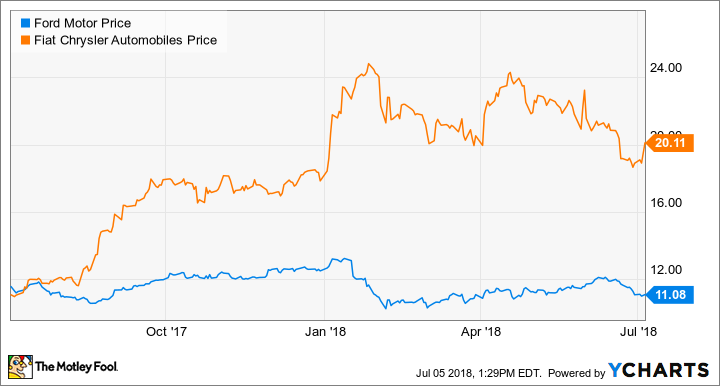Automakers are bracing for potential tariff-related disruption later this year, but for now they are benefiting from strong demand. The combination of low unemployment and tax cuts that took effect earlier this year has encouraged consumers to step up their purchases of pricey trucks, SUVs, and crossovers.
This healthy demand translated to strong sales in June for Ford Motor (F 1.70%) and Fiat Chrysler (FCAU). That's welcome news for investors -- particularly Ford shareholders.
Ford continues its sales turnaround
During the first four months of 2018, Ford's U.S. deliveries fell by 3.3%, primarily because of a double-digit decline in car sales. Strong demand for trucks -- particularly Ford's popular F-Series pickups -- was more or less offset by a modest decline in crossover/SUV sales.

Strong F-Series truck sales have kept Ford's profit afloat. Image source: Ford Motor Company.
However, Ford seems to be turning a corner in its home market. U.S. deliveries rose 0.7% in May, with a 3.5% increase in sales to retail customers more than offsetting a 4.6% decline in fleet sales (a result of order timing). The turnaround continued last month, as Ford's U.S. deliveries rose 1.2%, including a 2.9% increase in retail sales.
Obviously, a 1.2% sales increase by itself isn't much to brag about. However, Ford is seeing strong demand for its most lucrative models. For example, F-Series deliveries inched up 1.7% to 79,204 in June, despite supply constraints. Additionally, retail sales of the Lincoln Navigator luxury SUV more than doubled once again, with customers gravitating toward the most expensive options. As a result, Ford's average transaction prices rose $540 in the first half of the year.
Fiat Chrysler also has a strong June
Fiat Chrysler has been one of the best-performing automakers in the U.S. market year to date. Its domestic deliveries are up 4.5%, including a stellar 8% gain last month.
The main source of Fiat Chrysler's 2018 growth has been its Jeep brand. Last year, Fiat Chrysler decided to follow many of its peers by sharply reducing its sales to rental car companies. (These sales tend to be less profitable and can pull down used car values.) As a result, Jeep sales plunged 10.6% in 2017. Having gotten that pain out of the way, the Jeep brand has returned to its previous trend of breakneck growth.
Last month, Jeep deliveries rose 18.9% in the U.S., hitting a record for June. Year to date, Jeep deliveries have surged 21.8%. Domestic sales for Fiat Chrysler's other brands -- Alfa Romeo, Chrysler, Dodge, Fiat, and Ram -- declined 6.1% in the first six months of 2018. Given that Jeep deliveries carry high margins, this is a good trade-off for the company.
Why Ford stock looks like a buy
Fiat Chrysler stock has nearly doubled over the past year, due to the strength of the Jeep brand and profitability improvements related to its improving sales mix. By contrast, Ford stock has gone nowhere over the past year and remains near a multiyear low.
Ford vs. Fiat Chrysler stock performance, data by YCharts.
While Ford stock is out of favor right now, it could be primed for a comeback over the next two to three years. Ford is in the early stages of a multiyear new-product offensive that will give it the freshest vehicle portfolio in the industry by 2020 while shifting its vehicle mix even further toward trucks, SUVs, and crossovers.
The first new product for the domestic market -- the Ford EcoSport subcompact crossover -- is gaining momentum. In June, it achieved a monthly record with 6,756 deliveries. All-new versions of the Ford Expedition and Lincoln Navigator full-size SUVs are also selling well.
By the end of 2019, Ford will have released new versions of most of its crossover, SUV, and truck models. It will also start selling the Ranger midsize pickup, the Focus Active crossover, and the Lincoln Aviator SUV next year. Other new and redesigned models will arrive in 2020. Meanwhile, Ford is steadily phasing out most of its traditional car models in the U.S. market.
The biggest reason for Ford's recent underperformance is its aging product portfolio. Once that problem is fixed, Ford's domestic market share and profitability should improve dramatically. Furthermore, Ford has a large domestic manufacturing footprint, which will protect it from the worst impact of any potential trade war. As a result, Ford stock looks appealing for investors willing to stomach some short-term volatility.






